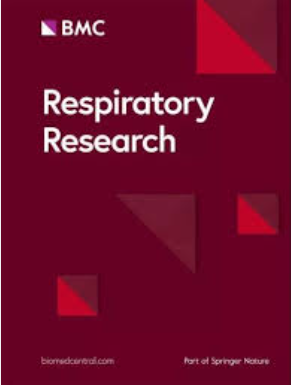耐多药细菌在有创机械通气断奶中的作用
IF 4.7
2区 医学
Q1 RESPIRATORY SYSTEM
引用次数: 0
摘要
虽然耐多药细菌(MDR)在接受长期断奶的患者中很常见,但有关其对断奶和患者预后影响的数据却很少。这是一项回顾性分析,研究对象是 2018 年 1 月至 2020 年 12 月期间在一所大学断奶中心接受长期断奶的连续患者。与 3c 类(断奶失败 3cI 或死亡 3cII)相比,本研究调查了 MDR 定植和感染对断奶成功(3a 类和 3b 类)、有创机械通气(IMV)成功延长断奶(无论是否需要无创通气(NIV))的影响。考虑的病原体组别包括:耐多药革兰氏阴性菌(MDRGN)、耐甲氧西林金黄色葡萄球菌(MRSA)和耐万古霉素肠球菌属(VRE)。共对 206 名患者进行了研究,其中 91 人(44.2%)有证据显示感染了 MDR 细菌(32% 为 VRE,1.5% 为 MRSA,16% 为 MDRGN),25 名患者也符合 MDR 感染的标准。206 名患者中有 70.9% 成功脱离了 IMV,8.7% 死亡。72.2%的病例死亡的主要原因是院内肺炎和其他感染。与无 MDR 证据的患者相比,有 MDR 证据(感染和定植)的患者断奶失败的发生率更高(48% vs. 34.8% vs. 21.7%)。在多变量分析中,MDR 感染(OR 4.9,p = 0.004)与男性(OR 2.3,p = 0.025)、Charlson 综合征指数(OR 1.2,p = 0.027)、pH 值(OR 2.7,p < 0.001)和入院前 IMV 持续时间(OR 1.01,p < 0.001)一起成为断奶失败的独立风险因素。此外,MDR 感染是导致死亡(3cII 类)的唯一独立风险因素(OR 6.66,p = 0.007)。MDR感染患者在断奶过程中死亡的几率明显更高。目前急需开发非抗生素方法来预防和治疗 MDR 感染,并对长期断奶和重症监护病房的抗生素管理进行临床研究。本文章由计算机程序翻译,如有差异,请以英文原文为准。
Role of multidrug-resistant bacteria in weaning from invasive mechanical ventilation
Although multidrug-resistant bacteria (MDR) are common in patients undergoing prolonged weaning, there is little data on their impact on weaning and patient outcomes. This is a retrospective analysis of consecutive patients who underwent prolonged weaning and were at a university weaning centre from January 2018 to December 2020. The influence of MDR colonisation and infection on weaning success (category 3a and 3b), successful prolonged weaning from invasive mechanical ventilation (IMV) with or without the need for non-invasive ventilation (NIV) compared with category 3c (weaning failure 3cI or death 3cII) was investigated. The pathogen groups considered were: multidrug-resistant gram-negative bacteria (MDRGN), methicillin-resistant Staphylococcus aureus (MRSA) and vancomycin-resistant Enterococcus spp. (VRE). A total of 206 patients were studied, of whom 91 (44.2%) showed evidence of MDR bacteria (32% VRE, 1.5% MRSA and 16% MDRGN), with 25 patients also meeting the criteria for MDR infection. 70.9% of the 206 patients were successfully weaned from IMV, 8.7% died. In 72.2% of cases, nosocomial pneumonia and other infections were the main cause of death. Patients with evidence of MDR (infection and colonisation) had a higher incidence of weaning failure than those without evidence of MDR (48% vs. 34.8% vs. 21.7%). In multivariate analyses, MDR infection (OR 4.9, p = 0.004) was an independent risk factor for weaning failure, along with male sex (OR 2.3, p = 0.025), Charlson Comorbidity Index (OR 1.2, p = 0.027), pH (OR 2.7, p < 0.001) and duration of IMV before admission (OR 1.01, p < 0.001). In addition, MDR infection was the only independent risk factor for death (category 3cII), (OR 6.66, p = 0.007). Patients with MDR infection are significantly more likely to die during the weaning process. There is an urgent need to develop non-antibiotic approaches for the prevention and treatment of MDR infections as well as clinical research on antibiotic stewardship in prolonged weaning as well as in ICUs.
求助全文
通过发布文献求助,成功后即可免费获取论文全文。
去求助
来源期刊

Respiratory Research
医学-呼吸系统
自引率
1.70%
发文量
314
期刊介绍:
Respiratory Research publishes high-quality clinical and basic research, review and commentary articles on all aspects of respiratory medicine and related diseases.
As the leading fully open access journal in the field, Respiratory Research provides an essential resource for pulmonologists, allergists, immunologists and other physicians, researchers, healthcare workers and medical students with worldwide dissemination of articles resulting in high visibility and generating international discussion.
Topics of specific interest include asthma, chronic obstructive pulmonary disease, cystic fibrosis, genetics, infectious diseases, interstitial lung diseases, lung development, lung tumors, occupational and environmental factors, pulmonary circulation, pulmonary pharmacology and therapeutics, respiratory immunology, respiratory physiology, and sleep-related respiratory problems.
 求助内容:
求助内容: 应助结果提醒方式:
应助结果提醒方式:


